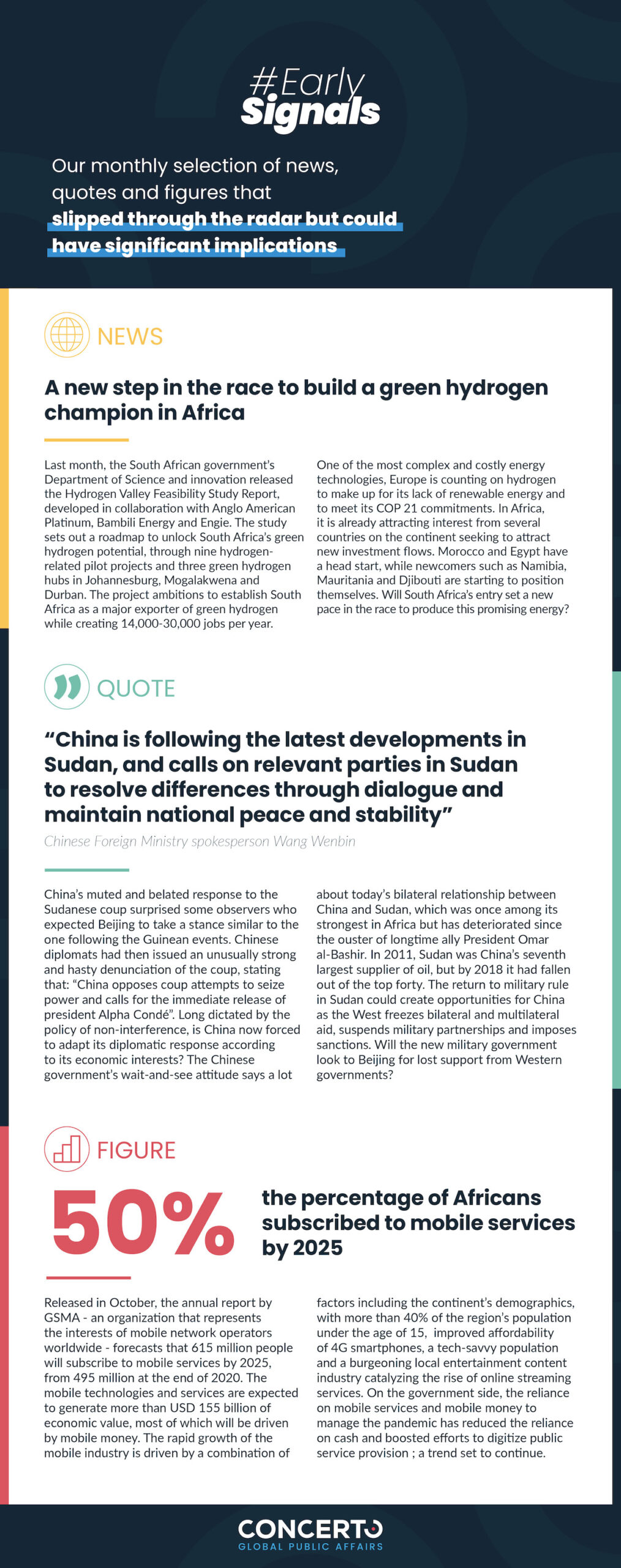Back
Our monthly selection of news, quotes and figures that slipped through the radar but could have significant implications
10 November 2021

Analysis
#EarlySignals - Nov. 2021
NEWS
A new step in the race to build a green hydrogen champion in Africa
Last month, the South African government’s Department of Science and innovation released the Hydrogen Valley Feasibility Study Report, developed in collaboration with Anglo American Platinum, Bambili Energy and Engie. The study sets out a roadmap to unlock South Africa’s green hydrogen potential, through nine hydrogen- related pilot projects and three green hydrogen hubs in Johannesburg, Mogalakwena and Durban. The project ambitions to establish South Africa as a major exporter of green hydrogen while creating 14,000-30,000 jobs per year. One of the most complex and costly energy technologies, Europe is counting on hydrogen to make up for its lack of renewable energy and to meet its COP 21 commitments. In Africa, it is already attracting interest from several countries on the continent seeking to attract new investment flows. Morocco and Egypt have a head start, while newcomers such as Namibia, Mauritania and Djibouti are starting to position themselves. Will South Africa’s entry set a new pace in the race to produce this promising energy?QUOTE
“China is following the latest developments in Sudan, and calls on relevant parties in Sudan to resolve differences through dialogue and maintain national peace and stability" Chinese Foreign Ministry spokesperson Wang WenbinChina’s muted and belated response to the Sudanese coup surprised some observers who expected Beijing to take a stance similar to the one following the Guinean events. Chinese diplomats had then issued an unusually strong and hasty denunciation of the coup, stating that: “China opposes coup attempts to seize power and calls for the immediate release of president Alpha Condé”. Long dictated by the policy of non-interference, is China now forced to adapt its diplomatic response according to its economic interests? The Chinese government’s wait-and-see attitude says a lot about today’s bilateral relationship between China and Sudan, which was once among its strongest in Africa but has deteriorated since the ouster of longtime ally President Omar al-Bashir. In 2011, Sudan was China’s seventh largest supplier of oil, but by 2018 it had fallen out of the top forty. The return to military rule in Sudan could create opportunities for China as the West freezes bilateral and multilateral aid, suspends military partnerships and imposes sanctions. Will the new military government look to Beijing for lost support from Western governments?
FIGURE
50% - The percentage of Africans subscribed to mobile services by 2025
Released in October, the annual report by GSMA - an organization that represents the interests of mobile network operators worldwide - forecasts that 615 million people will subscribe to mobile services by 2025, from 495 million at the end of 2020. The mobile technologies and services are expected to generate more than USD 155 billion of economic value, most of which will be driven by mobile money. The rapid growth of the mobile industry is driven by a combination of factors including the continent’s demographics, with more than 40% of the region’s population under the age of 15, improved affordability of 4G smartphones, a tech-savvy population and a burgeoning local entertainment content industry catalyzing the rise of online streaming services. On the government side, the reliance on mobile services and mobile money to manage the pandemic has reduced the reliance on cash and boosted efforts to digitize public service provision ; a trend set to continue.